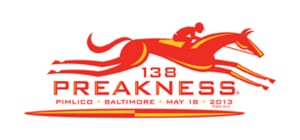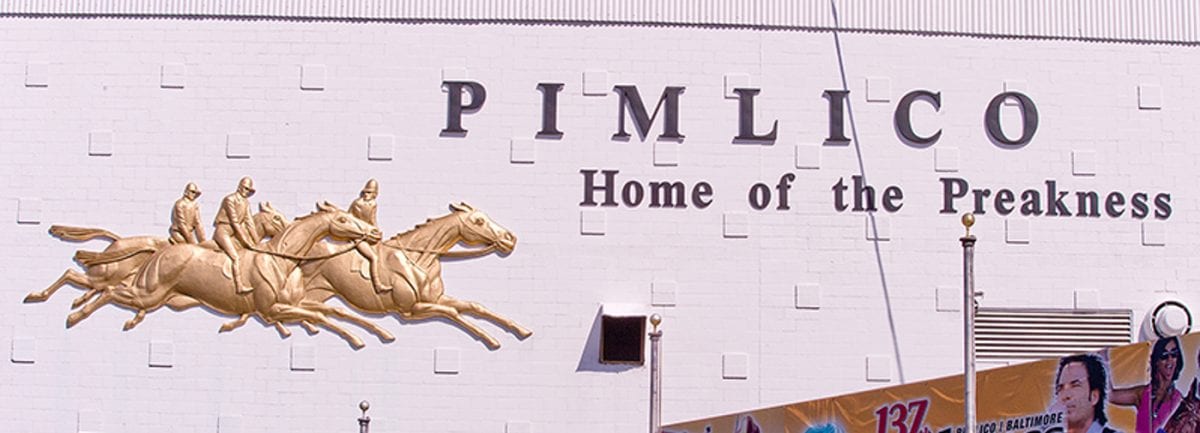Unsung: Stakes Coordinator scrambling until the last race is run
by Frank Vespe
It’s nice to have 499 nominations, which is what the Preakness weekend supporting stakes attracted, Coley Blind is telling me. But it’s not the same as having full fields in every race.
Nominations are but one step in a lengthy process that concludes — when? At the time of entry? When the races goes off?
“On Sunday, after the races,” Blind says. “That’s when we all take a deep breath.”
Blind is the stakes coordinator at the Maryland Jockey Club. He, racing secretary Georganne Hale, and their staff have the daunting task of surrounding the Preakness with races that compel the public’s attention. This year, Pimlico will card 13 other stakes and two starter handicaps Preakness weekend, and it’s safe to say that these races won’t fill themselves.
Entering a stakes race is typically a three-step process. Horses must first be nominated to the race — usually 10 days or so prior to the race. They are then entered at the normal time of entry, three or so days prior to the rac e. And then, finally, they start. For some races, there is a fee at each step: to nominate, to pass the entry box, and to start. For others, there is no nomination fee. Total per-horse fees usually amount to around one percent of the guaranteed purse.
e. And then, finally, they start. For some races, there is a fee at each step: to nominate, to pass the entry box, and to start. For others, there is no nomination fee. Total per-horse fees usually amount to around one percent of the guaranteed purse.
Three of the stakes on Friday’s Black-Eyed Susan day card have drawn more than 10 entries, with the grassy, five-furlong The Very One attracting 16 (though only 14 will race). That speaks to the work that Blind and his crew have done.
“We start working on the Preakness, just talking to people, in January,” Blind says. As he travels the country throughout the year, he connects with trainers and owners, trying to sell them on the virtues of running in Maryland. But it’s not until about two weeks before the Kentucky Derby that crunch time begins for the state’s biggest racing weekend.
At that point, Blind says, he and his staff have a reasonably good sense of which horses belong in which races — and what schedules they are on. That sense comes from keeping an eye on almost everything, from rising young horses to established stars.
Maryland has a couple of disadvantages that challenge Blind and company. For one thing, stakes purses at the track have in recent years lagged behind those offered by some other racetracks. With the infusion of slots money, though, that is changing; this year the purse for the Grade 2 Black-Eyed Susan jumped a couple of hundred thousand dollars, to $500,000. And last year, the Maryland Jockey Club brought back the previously mothballed Pimlico Special; that race has a juicy $300,000 purse.
For another, carding races two weeks after Churchill Downs’s biggest weekend complicates matters. Horsemen these days prefer to give their horses more time — three weeks or even longer in some cases — than the 14 days between Derby weekend and Preakness weekend. Moreover, many of the Churchill races offer more money or higher grades than do their Maryland counterparts.
But all is not lost. That, says Blind, is because “horsemen love Pimlico and the Preakness. That’s a common thread everywhere I go.”
If the quality of the racing surfaces is one reason, presumably the quality of the crab cakes and fried chicken at the Alibi Breakfast is another.
Actually, says Blind, that last isn’t so far-fetched. “We [the Maryland Jockey Club] like horses, and we like horse racing,” he comments. “And we have a little bit of the middle child syndrome; we have to try harder.”
[pullquote]We have a little bit of the middle child syndrome; we have to try harder.”[/pullquote]That “trying harder” particularly manifests itself once the horses are on the grounds. “We make every effort to make sure that everything is as easy as possible,” Blind says, “and that everyone is as happy as possible.” Need to know who to call for tack or feed? Or for Orioles tickets? You can call Blind, and he’ll run down the answer.
“This organization… I won’t even say we go out of our way, because it is our way: to make horsemen feel welcome,” Blind says.
Blind says he also strives to be honest with owners and trainers, because ultimately that’s what fills races. “We really stress where the horse fits in the race,” he says. And they’ll try hard to lock down those that do. “Always, our primary objective is a full field of quality horses.”
As for this weekend, Blind declines to play favorites but allows that the Grade 2 Dixie is shaping up to be an interesting race. It attracted 36 nominations — but, Blind hastens to remind me, nominations aren’t entries. To get those, he’ll keep trying harder, up to, and beyond, when entries close.








